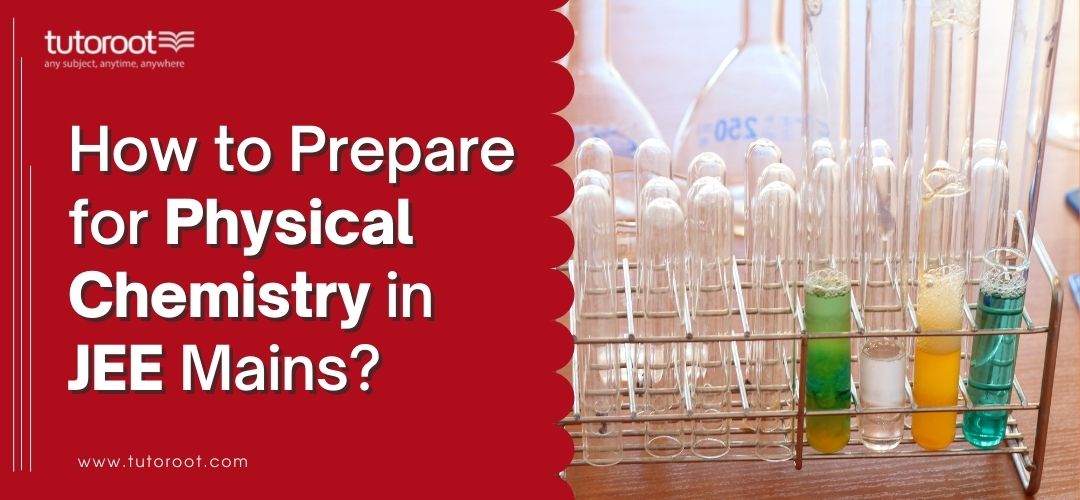How to Prepare for Physical Chemistry in JEE Mains?
Many JEE aspirants neglect chemistry because they believe it is “less tricky” than math and physics. This is the case. Poor practise, on the other hand, may lose pupils their JEE marks. To get a decent JEE rank, you must focus equally on all three subjects.
Physical and General Chemistry, Inorganic Chemistry, and Organic Chemistry are all covered in the JEE Main Chemistry syllabus. In this article, we will focus on Physical Chemistry.
The concept of a Mole is the most crucial topic in Physical Chemistry for JEE Main. The Mole concept is used in a variety of reactions, including the Redox Reaction. This topic should therefore be thoroughly understood to earn higher grades.
In Atomic Structure, one’s formulae and fundamental concepts should be clear because many questions from this chapter are frequently asked in the JEE Main examination. Quantum Numbers, the Wavelength of Electronic Transition, and Ionisation Energy are covered in-depth in this chapter.
The candidates’ understanding of the Gaseous State and Solid State and topics such as the Van Der Waals equation, Kinetic Theory of Gases, and Types of Molecular Velocity should be crystal clear if they are to achieve high scores in the JEE.
The following topics are given equal importance in the JEE MAINS examination:
- Solutions
- Electrochemistry and Redox Reactions are two essential topics in chemistry.
- The Interaction of Chemical Bonds and Molecular Structure
- Thermodynamics of Chemical Reactions
- Equilibrium
- Surface Chemistry is a branch of chemistry that deals with the surface of things.
- Kinetics of Chemical Reactions
Physical Chemistry questions from these topics are typically asked in groups of 8-12 questions. However, you must grasp the concepts presented here before proceeding to the actual solution of the problems.
The following are some pointers to keep in mind as you prepare for the JEE Physical Chemistry examination:
- Read the chapters from the NCERT textbook.
- Make a list of the formulas that are important to you on a sheet of paper.
- Read the same chapters from the same reference books again and again.
- Understand how the formulas are used and how they are applied.
- Extra information from the reference books should be included in your notes.
- Begin answering questions on your initiative.
- Make all of your revisions in the same order.
Physical chemistry should be approached by first understanding the concept and then understanding the formulas. Solve the problem using each of the formulas. Make a small notebook, and in that notebook, make a list of all of the formulas, organised by chapter.
There are chapters in Inorganic Chemistry that, once mastered, will make the rest of the chemistry portion of the course much easier. One of the most important pieces of advice for studying inorganic chemistry is to thoroughly understand the periodic table. If you do this, you will not be leaving even a single question unanswered from this section of the JEE examinations.
Related Query’s:
- How to prepare chemistry for jee mains in 3 months?
. Make a plan for success and follow it.
. Learn test-taking and exam strategies.
. Get the most used books for JEE Main preparation. - What is the weightage of organic chemistry in jee mains?
. Some basic principles of organic chemistry: Nomenclature, electronic displacement in a covalent bond, common types of organic reactions- 6.33%.
. Hydrocarbons: Alkanes, Alkenes, Alkynes, Aromatic hydrocarbon- 6.33%.
. Organic compounds containing Oxygen: Alcohols, phenols and ethers, Aldehyde and ketones, Carboxylic acid – 8.33%. continue. . . . - How to prepare chemistry for jee mains?
. Understand reaction mechanism.
. Develop problem-solving skills.
. Practice different types of questions. - How to study Inorganic chemistry chapters for jee?
. Start with the most important chapters such as p Block, s Block, and Chemical Bonding. After that, go on to less crucial subjects based on their weightage.
. Utilize the NCERT books to their greatest potential: Most of the time, students do not adequately read the NCERT and instead study from other required materials, leaving them with an extensive curriculum and limited time. You should begin your preparation with NCERT because that is where most of the questions will be found.
.Take the main exam with the inorganic chemistry section: Most people do not prepare for inorganic chemistry because each chapter contains a lot of material and requires a lot of studying.
. Make a list of all the facts and exceptions in one place to help you revise quickly and boost your chances of scoring well in this area.
. Use the following books to practise: Practicing answering the questions and following the format will help you improve your recall abilities and time and efficiency when taking the IIT JEE Main exam, where every second counts. continue . . . . .

